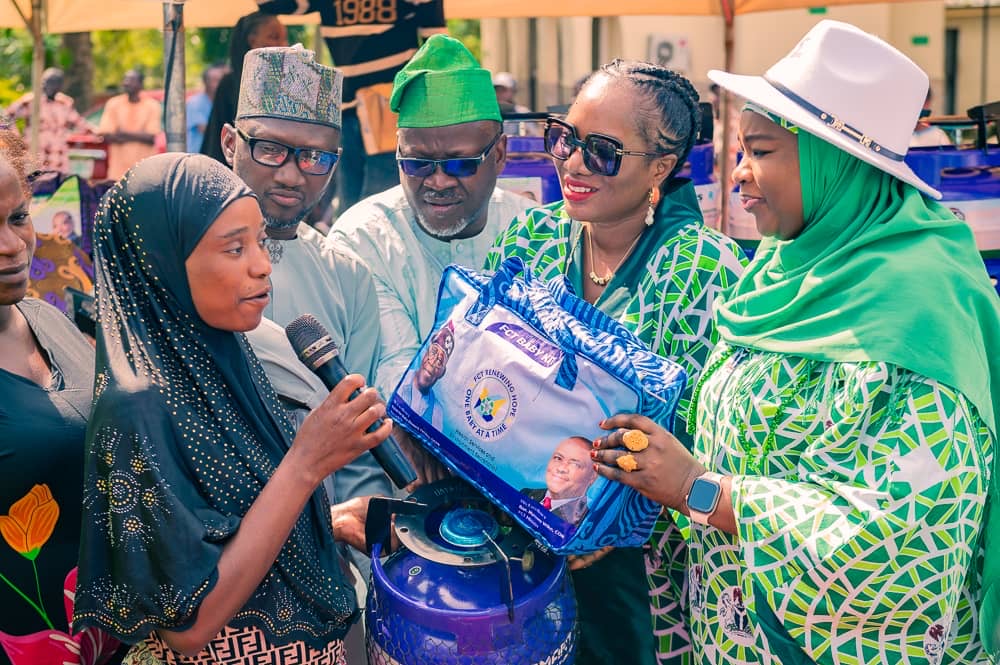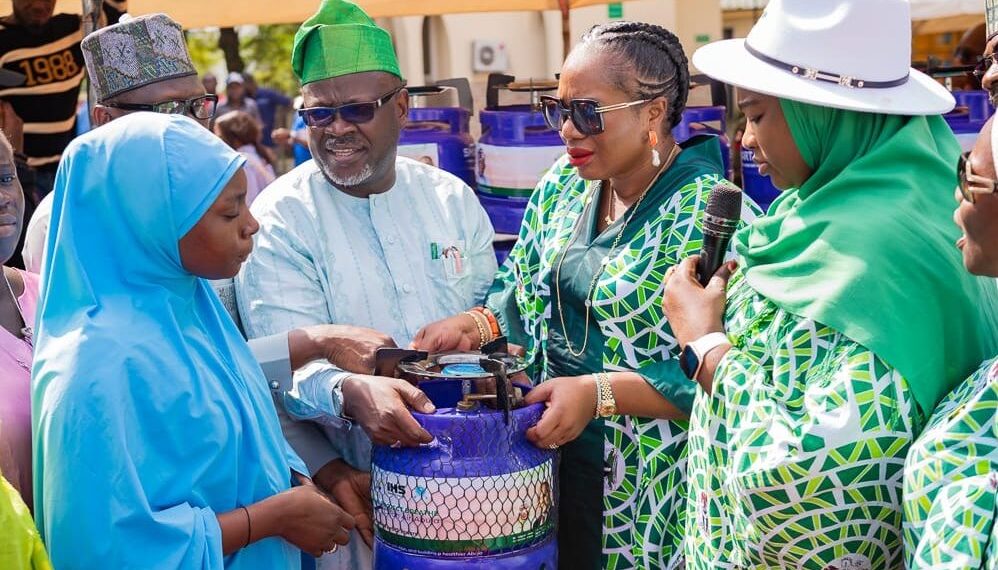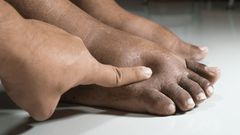The Federal Capital Territory Administration (FCTA) has unveiled two major initiatives aimed at addressing pressing health and environmental issues affecting families in Abuja: the Mother–Baby Kit Project and Project Breathe Clean Air-Abuja. These interventions are designed to reduce maternal and newborn mortality while fighting hazardous household air pollution, a growing concern in many Nigerian homes.
During the launch event held in Abuja, the Minister of State for the Federal Capital Territory, Dr. Mariya Mahmoud, emphasised the importance of equipping every woman with the resources and support she requires for safe childbirth, and ensuring every newborn receives proper care. “No woman should face childbirth without the tools and support she needs, and no child should begin life without adequate care,” Dr. Mahmoud stated, according to official reports. She noted that these new projects reflect a comprehensive response to family health challenges, tackling maternal and neonatal risks alongside environmental hazards in the home.
Explaining further, Dr. Mahmoud described the initiatives as a demonstration of the FCTA’s commitment to giving families in the region a better start and a safer environment. The administration believes that providing necessary health tools and reducing pollution can transform lives, laying the foundation for healthier communities in the capital and beyond.
“These kits reflect our deep commitment to maternal and child health and to ensuring that every mother and baby is given the best start possible,” she said at the event, reiterating the administration’s resolve to go beyond lip service in the drive to improve public health.
Mother–Baby Kit Project: Supporting Healthy Deliveries
The Mother–Baby Kit Project, with the tagline “Renewing Hope: One Baby at a Time,” is structured to supply pregnant women across the FCT with crucial materials for safe delivery. This support package includes essential items such as a maternity gown, baby suit, sanitary pads, solar lantern for uninterrupted lighting, baby shawl, sponge, towel, plate and spoon, and baby diapers. By providing such necessities, the FCTA aims to reduce birth-related complications that can arise due to lack of supplies, especially in rural and peri-urban areas.
Project Breathe Clean Air-Abuja: Tackling Indoor Air Pollution
Complementing the Mother–Baby Kit Project, Project Breathe Clean Air-Abuja—branded “Renewing Hope: One Home at a Time”—addresses a different but equally urgent issue. It aims to reduce the negative health impact of using high-emission fuels such as firewood, charcoal, and kerosene for household cooking. Instead, the project promotes switching to Liquefied Petroleum Gas (LPG), a cleaner and more efficient energy source. The Breathe Clean Air project is being executed in collaboration with IHS Nigeria, bringing together private sector expertise and public sector reach.

Dr. Mahmoud described Project Breathe Clean Air-Abuja as a bold, future-oriented intervention that directly tackles a hidden but lethal health threat: respiratory diseases caused by smoke inhalation from traditional cooking methods. She pointed out that by replacing firewood, charcoal, and kerosene with LPG, families can significantly lower household emissions, which also helps curb deforestation and move Nigeria closer to its climate commitments.
“This programme will also reduce harmful household emissions, cut deforestation, and advance Nigeria’s clean energy transition,” Dr. Mahmoud said, noting its environmental, health, and social benefits.
According to the minister, these initiatives are part of a broader “Renewed Hope Agenda” that has been reshaping the FCT’s healthcare landscape over the past two years. The agenda has seen the establishment of vital health infrastructure, such as oxygen plants, a Vesico-Vaginal Fistula Centre, and the expansion of health insurance to vulnerable groups, among other large-scale projects.
Dr. Mahmoud also highlighted improvements in training and service conditions for health workers, renovations of healthcare facilities, and the creation of the Public Health Emergency Operations Centre, all geared towards building a more resilient health system.
“Together, these projects represent a holistic vision of health: protecting mothers and newborns during childbirth while safeguarding families from the dangers of household air pollution,” the minister concluded.
Community Engagement: Distribution of Kits and Resources
During the kickoff, FCTA gave out free mother-baby kits and LPG cylinders to beneficiaries drawn from across the territory. Dr. Mahmoud announced that the distribution targets women who would otherwise face barriers to safe maternity care. The package is designed to promote hygienic childbirth and ensure that even resource-constrained families are not left behind as Nigeria works towards reducing preventable maternal and infant deaths.
The significance of these distributed materials is echoed by community health leaders. Dr. Adedolapo Fasawe, Mandate Secretary of the FCT Health Services and Environment Secretariat (HSES), said, “Providing these kits free of charge, especially to the most vulnerable in rural and peri-urban communities, removes a significant obstacle to safe motherhood.”
She further noted that the project aligns with the federal government’s ongoing health reforms, specifically those tied to Universal Health Coverage (UHC), and supports the United Nations Sustainable Development Goal Three—ensuring healthy lives and promoting well-being for all ages.
“Today, we are all gathered to renew hope in accordance with this goal, ‘One baby at a time.’ The FCT Administration, under the visionary leadership of Minister Nyesom Wike, is committed to investing in strategic health interventions that make a tangible difference in people’s lives,” Dr. Fasawe declared at the launch. She confirmed that the initiative will be expanded to all six area councils of the FCT over time.
Dr. Fasawe also extended gratitude to development partners, NGOs, and community leaders for their roles in supporting the initiatives. She commended the efforts of frontline health providers who she described as “true heroes bringing compassion and dedication to this initiative.” urging expectant mothers to utilize antenatal care and safe delivery services offered in their communities.
Broader Social Impact and Testimonies
Baba-Gana Adam, Permanent Secretary of FCT HSES, characterized the event as a “three-in-one” milestone: the distribution of baby kits, free cooking gas, and enrolment of pregnant women in the territory’s health insurance scheme. According to Adam, at least 250 mother-baby kits and 500 LPG cylinders were distributed during the inauguration. “No mother and no family will be left behind as we move around the six Area Councils under the Project Breathe Clean Air-Abuja campaign and the One Baby at a Time initiative,” he affirmed in his address.
For beneficiaries like Sadiya Aliyu, the impact is already being felt. “I never believed that I could receive something like this without having to pay. The baby kit will help me give birth safely and hygienically, and the gas cylinder means I won’t have to use charcoal anymore,” Sadiya shared, expressing her gratitude for how the assistance eases the financial and health burdens facing Nigerian women. “With this gas cylinder, I can cook faster and cleaner. This support from FCTA has really lifted a burden off my shoulders,” she added.
Several other recipients and community leaders at the event voiced similar sentiments, applauding the joint impact of the mother-baby kits and clean energy resources. According to public health advocates, such integrated interventions are increasingly important as Nigeria continues to grapple with high rates of maternal mortality and health-threatening levels of household air pollution. Estimates from the World Health Organization attribute thousands of deaths nationwide each year to preventable complications at childbirth and to respiratory illnesses linked to traditional cooking fuels.
Looking Forward: Challenges, Expansion, and Global Context
While the new FCTA initiatives mark a vital step towards safer homes and healthier births, experts caution that significant challenges remain. Many rural areas still lack comprehensive healthcare coverage or easy access to LPG, and the cost of continued distribution and education remains high. Nonetheless, Nigerian policymakers say they are determined to scale up outreach, citing partnerships with industry stakeholders and development agencies to secure resources and ensure sustainable impact.
Comparing Abuja’s approach to those in other West African countries, such as Ghana, where maternal and neonatal health investments have also improved outcomes according to UNICEF, underscores the importance of multisector action. Early responses from local and international NGOs suggest that this blend of health and clean energy support could serve as a model for other parts of Africa.
For Nigeria, these projects directly address national health priorities set by policymakers and complement broader environmental campaigns targeting climate adaptation, clean energy transition, and forest preservation. Their ongoing success, observers note, hinges on sustained funding, awareness campaigns, and greater involvement of both private and community leaders.
As the initiatives roll out across all six area councils of the FCT, the hope is that more families—regardless of income or location—will benefit, and Nigeria will edge closer to achieving critical health and environmental benchmarks. For now, according to those in attendance, the projects offer renewed optimism for expectant mothers, newborns, and households yearning for a cleaner, safer future.
What’s your perspective on these new FCTA initiatives? Have you or someone you know benefited from similar programmes, or do you see challenges that remain unaddressed? Drop your comments below and follow us for the latest updates on health and community stories!
For general support or news tips, reach out to support@nowahalazone.com.
Join the conversation! Follow us on Facebook, X (Twitter), and Instagram for more inspiring updates and in-depth features on issues that matter to you.










